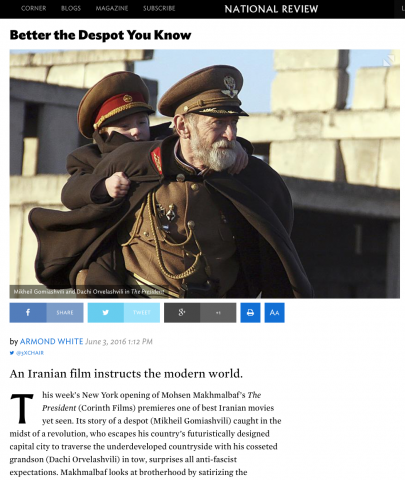
National Review
3 June, 2016 | By Armond White
An Iranian film instructs the modern world.
This week’s New York opening of Mohsen Makhmalbaf’s The President (Corinth Films) premieres one of best Iranian movies yet seen. Its story of a despot (Mikheil Gomiashvili) caught in the midst of a revolution, who escapes his country’s futuristically designed capital city to traverse the underdeveloped countryside with his cosseted grandson (Dachi Orvelashvili) in tow, surprises all anti-fascist expectations. Makhmalbaf looks at brotherhood by satirizing the highhanded excesses of nationhood.
Makhmalbaf was jailed in 1974 at age 17 for stabbing a policeman — as recounted in his semi-documentary masterpiece A Moment of Innocence (he was released during the 1979 Iranian revolution and has lived in France since). He gives The President his fantasy perspective on the moral complications that occur when an autocrat faces populist zeal that has turned. This near-parable avoids the sanctimony Americans are accustomed to from banal films that judge powerful men against the suffering multitudes.
Through Makhmalbaf’s middle-aged wisdom, The President first reveals ruling-class family dynamics, then the anxiety and fear of these empowered people when they are suddenly leveled with their subjugated hordes. This Georgian, U.K., French, and German co-production feels stateless. It’s both anecdotal and epic, like Makhmalbaf’s previous A Moment of Innocence, Salaam Cinema, and The Silence, and like The Day I Became a Woman, by his wife, Marziyeh Meshkiny. Every scene reveals political complexities that filmmakers from democratic societies too often gloss over.
On the run, the president realizes that the mob is as dangerous as he ever was (he changes clothes and identities with various peasants while United Opposition Forces continually escalate the bounty on his capture). Makhmalbaf’s comedy-drama ponders the futility of social revolution through individuated experience, not the idealized vengeance of so-called “movements.” There can be no better parallel to our contemporary “protests” than images of the president’s stalled limousine surrounded by a flock of metaphorical sheep. (The mob’s ideas on punishment undermine “I am Spartacus” sanctimony.)
As Iran’s most accessible great filmmaker (possessing a more popular touch than Abbas Kiarsostami), Makhmalbaf could have titled his movie “The Dictator” but instead chose “The President” – not only evoking Carl Dreyer’s 1919 metaphysical silent film but also to achieve an ideological coup, as Italy’s Marco Bellocchio did in Vincere, the backward-glancing study of Benito Mussolini’s mistreatment of his estranged son and his wife, Ida Dalser. Vincere was timed to play off popular worship of both Silvio Berlusconi and Barack Obama; its portrait of a vain politician became a profound flipside examination of obsessional devotion from presumably democratic masses.
The President’s picaresque plot risks satirizing what leaders and followers, the elite and hoi polloi, have in common. (The irony recalls Jay Nordlinger’s book on despotism, Children of Monsters.) Overall, Makhmalbaf dares the most ironic film examination of noblesse oblige since Renoir’s La Grande Illusion. The “Love thy enemy” theme is made harrowing by questioning ex-lovers, ex-servants, constituents, family members. Former revolutionary Makhmalbaf understands what radicals are loath to consider in their eagerness for revenge, slander, show trials, and annihilation.
This wild narrative proposes assorted memorable archetypes — the terrorist who doesn’t realize his capacity for forgiveness recalls Mizoguchi’s Sansho the Bailiff; the runaway elites evoke Godard’s Weekend; tortured political prisoners dressed like hooded monks recall Ichikawa’s Fires on the Plain; the cut from a boy’s street dance to a procession of distant vehicles resembles Spielberg’s fluency in War of the Worlds; and scenes mixing atrocity and sentiment match both Brecht and Chaplin.
I call out the big names because Makhmalbaf is a hypersophisticated cinéaste whose political equanimity is rare and invaluable.
— Armond White, a film critic who writes about movies for National Review Online, received the American Book Awards’ Anti-Censorship Award in 2014. He is the author of The Resistance: Ten Years of Pop Culture That Shook the World and the forthcoming What We Don’t Talk about When We Talk about the Movies.
Link to the source: National Review, 3 June 2016

